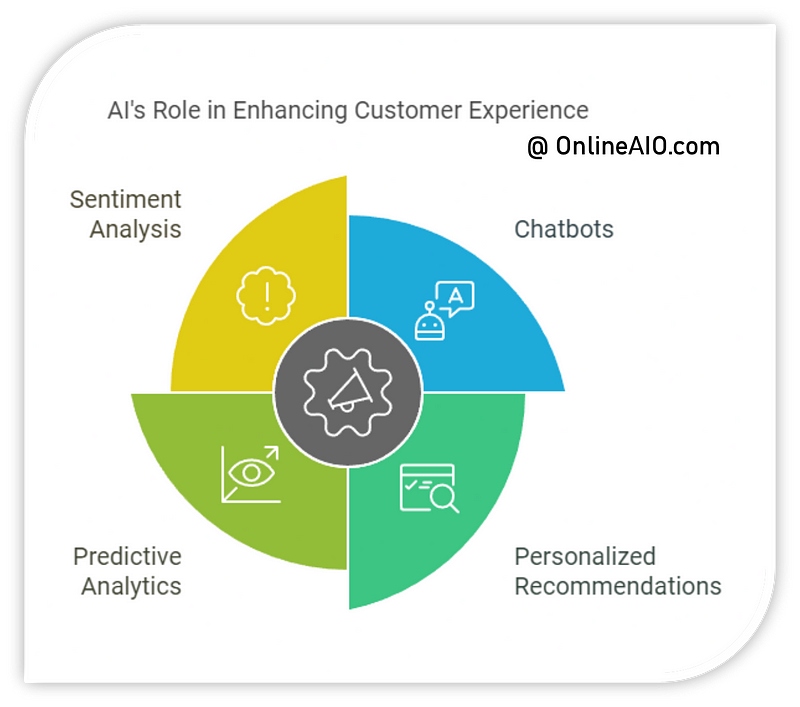How AI can help customer experience? (5 Ways)
AI is revolutionizing customer experience (CX) across various industries by providing personalized, efficient, and proactive interactions.
Learn How AI Enhances Customer Experience in 5 Best Ways at Online AIO
Here are some key ways AI contributes to improving customer experience:
1. Personalization
AI enables small and large businesses to deliver highly personalized experiences by analyzing customer data and behavior.
For instance, AI can suggest products or services tailored to individual preferences, enhancing customer satisfaction and encouraging repeat purchases.
This level of personalization is becoming central to corporate strategies, as seen with companies like Home Depot and Starbucks, which prioritize seamless omnichannel experiences
2. Real-Time Assistance
AI technologies, such as chatbots and virtual assistants, can provide immediate support to customers, eliminating long wait times for human agents.
This capability improves customer satisfaction and allows businesses to handle a higher volume of inquiries efficiently.
AI can anticipate customer needs and assist employees in real-time, ensuring high-quality outcomes.
3. Proactive Engagement
AI can help businesses engage with customers proactively by predicting their needs before seeking help.
This anticipatory service can significantly enhance the overall customer experience.
For example, AI can analyze patterns in customer interactions to identify potential issues and address them before they escalate.
4. Multilingual Support
AI can also facilitate communication by translating messages into local languages, making it easier for companies to serve diverse customer bases.
This capability broadens accessibility and improves the experience for non-native speakers.
5. Continuous Improvement
AI tools can track customer sentiment and feedback in real-time, allowing businesses to adapt their strategies quickly.
By analyzing qualitative data, AI can help identify the root causes of customer dissatisfaction and prioritize actions to enhance the customer experience.
This ongoing feedback loop is crucial for maintaining high standards of service.
AI is a powerful tool for enhancing customer experience by providing personalized interactions, real-time support, proactive engagement, multilingual capabilities, and continuous improvement.
As companies increasingly adopt AI technologies, the potential for improved customer satisfaction and loyalty continues to grow.
The Role of AI in Enhancing Customer Experience

AI plays a pivotal role in enhancing customer experience (CX) by providing innovative solutions that cater to individual preferences and streamline interactions.
One of the most significant contributions of AI is personalization.
Another critical area is intelligent automation. AI automates routine tasks such as data entry and lead scoring, allowing sales teams and customer support agents to focus on high-value activities.
AI-powered chatbots provide immediate assistance, handling inquiries and resolving issues 24/7, which enhances customer satisfaction by reducing response times.
9 Best AI-Powered Tools to Improve User Experience and Sales
AI-powered tools are transforming how businesses interact with customers and drive sales.
Here are nine of the best tools that can enhance user experience and boost sales:
1. Chatbots and Virtual Assistants
AI chatbots, such as Custom GPT or Chatbase AI, provide real-time customer support, answering queries and guiding users through the sales process.
They enhance user experience by offering immediate assistance and can significantly reduce response times.
2. Personalization Engines
Tools like Dynamic Yield use AI to analyze user behavior and preferences, allowing businesses to deliver personalized content and product recommendations.
This tailored approach can lead to higher conversion rates and improved customer satisfaction.
3. Predictive Analytics
Platforms such as Salesforce Einstein leverage AI to analyze data and predict customer behavior.
By understanding potential customer needs, businesses can tailor their marketing strategies and improve sales forecasting.
4. Email Automation
AI-driven email marketing tools like Beehiiv utilize machine learning to optimize email campaigns.
They can segment audiences, personalize content, and determine the best times to send emails, enhancing engagement and driving sales.
5. Customer Feedback Analysis
Tools like Qualtrics use AI to analyze customer feedback and sentiment.
By understanding customer opinions and experiences, businesses can make informed decisions to improve their products and services.
6. Sales Automation
AI sales tools such as HubSpot Sales automate repetitive tasks, allowing sales teams to focus on building relationships.
These tools can track interactions, schedule follow-ups, and provide insights into customer engagement.
7. Visual Search
Platforms like Pinterest Lens enable users to search for products using images instead of text.
This innovative approach enhances user experience by making it easier for customers to find what they are looking for, potentially increasing sales.
8. Recommendation Systems
AI tools like Amazon Personalize help businesses create recommendation systems that suggest products based on user behavior.
This not only improves user experience but also encourages upselling and cross-selling.
9. A/B Testing Tools
AI-powered A/B testing tools, such as Optimizely, allow businesses to test different versions of their websites or apps to determine which performs better.
This data-driven approach helps optimize user experience and maximize conversion rates.
By integrating these AI-powered tools, businesses can significantly enhance user experience and drive sales, ultimately leading to greater customer satisfaction and loyalty.
10 Common FAQs Related to AI Helping Customer Experience
Here are the 10 most common frequently asked questions regarding the role of AI in enhancing customer experience at OnlineAio.com:
1. How does AI improve customer service?
AI improves customer service by automating responses to common inquiries through chatbots, providing 24/7 support, and enabling quick resolution of issues.
It can also analyze customer data to personalize interactions.
2. What are the benefits of using AI for personalization?
AI-driven personalization allows businesses to deliver tailored content and recommendations based on individual user preferences and behaviors, leading to improved customer satisfaction and increased engagement.
3. Can AI predict customer behavior?
Yes, AI can analyze historical data and recognize patterns to predict future customer behaviors, helping businesses anticipate needs and tailor their strategies accordingly.
4. Are AI chatbots effective in handling customer inquiries?
AI chatbots are effective for handling routine inquiries and can significantly reduce response times.
They can provide instant answers, escalate complex issues to human agents, and improve overall efficiency.
5. How does AI enhance customer feedback analysis?
AI enhances customer feedback analysis by automating the processing of large volumes of feedback, identifying trends and sentiments, and providing actionable insights for improving products and services.
6. Can AI help in managing customer relationships?
Absolutely! AI tools in CRM systems automate routine tasks, segment customers based on behavior, and provide insights that help businesses nurture relationships and improve customer loyalty.
7. What industries benefit the most from AI in customer experience?
Industries such as healthcare, retail, finance, telecommunications, and travel significantly benefit from AI in enhancing customer experience through personalized recommendations and efficient service delivery.
8. Is customer data safe when using AI tools?
While AI tools can enhance customer experience, ensuring data security is crucial.
Most reputable AI solutions comply with data protection regulations and implement measures to safeguard customer information.
9. How can a business choose the right AI tool for customer experience?
Businesses should assess their specific needs, budget, and the features offered by different AI tools.
Considering factors such as scalability, integration with existing systems, and user-friendliness is also essential.
10. Will AI replace human customer service representatives?
AI is designed to complement human customer service, not replace it.
While AI handles routine inquiries, human agents are still necessary for complex issues that require empathy and nuanced understanding.
